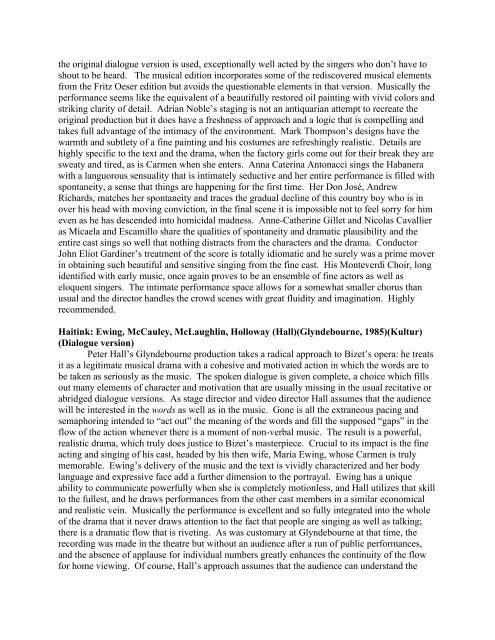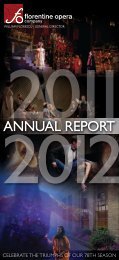1. Carmen on DVD--Complete Review(EDITED) - Florentine Opera
1. Carmen on DVD--Complete Review(EDITED) - Florentine Opera
1. Carmen on DVD--Complete Review(EDITED) - Florentine Opera
Create successful ePaper yourself
Turn your PDF publications into a flip-book with our unique Google optimized e-Paper software.
the original dialogue versi<strong>on</strong> is used, excepti<strong>on</strong>ally well acted by the singers who d<strong>on</strong>’t have to<br />
shout to be heard. The musical editi<strong>on</strong> incorporates some of the rediscovered musical elements<br />
from the Fritz Oeser editi<strong>on</strong> but avoids the questi<strong>on</strong>able elements in that versi<strong>on</strong>. Musically the<br />
performance seems like the equivalent of a beautifully restored oil painting with vivid colors and<br />
striking clarity of detail. Adrian Noble’s staging is not an antiquarian attempt to recreate the<br />
original producti<strong>on</strong> but it does have a freshness of approach and a logic that is compelling and<br />
takes full advantage of the intimacy of the envir<strong>on</strong>ment. Mark Thomps<strong>on</strong>’s designs have the<br />
warmth and subtlety of a fine painting and his costumes are refreshingly realistic. Details are<br />
highly specific to the text and the drama, when the factory girls come out for their break they are<br />
sweaty and tired, as is <str<strong>on</strong>g>Carmen</str<strong>on</strong>g> when she enters. Anna Caterina Ant<strong>on</strong>acci sings the Habanera<br />
with a languorous sensuality that is intimately seductive and her entire performance is filled with<br />
sp<strong>on</strong>taneity, a sense that things are happening for the first time. Her D<strong>on</strong> José, Andrew<br />
Richards, matches her sp<strong>on</strong>taneity and traces the gradual decline of this country boy who is in<br />
over his head with moving c<strong>on</strong>victi<strong>on</strong>, in the final scene it is impossible not to feel sorry for him<br />
even as he has descended into homicidal madness. Anne-Catherine Gillet and Nicolas Cavallier<br />
as Micaela and Escamillo share the qualities of sp<strong>on</strong>taneity and dramatic plausibility and the<br />
entire cast sings so well that nothing distracts from the characters and the drama. C<strong>on</strong>ductor<br />
John Eliot Gardiner’s treatment of the score is totally idiomatic and he surely was a prime mover<br />
in obtaining such beautiful and sensitive singing from the fine cast. His M<strong>on</strong>teverdi Choir, l<strong>on</strong>g<br />
identified with early music, <strong>on</strong>ce again proves to be an ensemble of fine actors as well as<br />
eloquent singers. The intimate performance space allows for a somewhat smaller chorus than<br />
usual and the director handles the crowd scenes with great fluidity and imaginati<strong>on</strong>. Highly<br />
recommended.<br />
Haitink: Ewing, McCauley, McLaughlin, Holloway (Hall)(Glyndebourne, 1985)(Kultur)<br />
(Dialogue versi<strong>on</strong>)<br />
Peter Hall’s Glyndebourne producti<strong>on</strong> takes a radical approach to Bizet’s opera: he treats<br />
it as a legitimate musical drama with a cohesive and motivated acti<strong>on</strong> in which the words are to<br />
be taken as seriously as the music. The spoken dialogue is given complete, a choice which fills<br />
out many elements of character and motivati<strong>on</strong> that are usually missing in the usual recitative or<br />
abridged dialogue versi<strong>on</strong>s. As stage director and video director Hall assumes that the audience<br />
will be interested in the words as well as in the music. G<strong>on</strong>e is all the extraneous pacing and<br />
semaphoring intended to “act out” the meaning of the words and fill the supposed “gaps” in the<br />
flow of the acti<strong>on</strong> whenever there is a moment of n<strong>on</strong>-verbal music. The result is a powerful,<br />
realistic drama, which truly does justice to Bizet’s masterpiece. Crucial to its impact is the fine<br />
acting and singing of his cast, headed by his then wife, Maria Ewing, whose <str<strong>on</strong>g>Carmen</str<strong>on</strong>g> is truly<br />
memorable. Ewing’s delivery of the music and the text is vividly characterized and her body<br />
language and expressive face add a further dimensi<strong>on</strong> to the portrayal. Ewing has a unique<br />
ability to communicate powerfully when she is completely moti<strong>on</strong>less, and Hall utilizes that skill<br />
to the fullest, and he draws performances from the other cast members in a similar ec<strong>on</strong>omical<br />
and realistic vein. Musically the performance is excellent and so fully integrated into the whole<br />
of the drama that it never draws attenti<strong>on</strong> to the fact that people are singing as well as talking;<br />
there is a dramatic flow that is riveting. As was customary at Glyndebourne at that time, the<br />
recording was made in the theatre but without an audience after a run of public performances,<br />
and the absence of applause for individual numbers greatly enhances the c<strong>on</strong>tinuity of the flow<br />
for home viewing. Of course, Hall’s approach assumes that the audience can understand the








